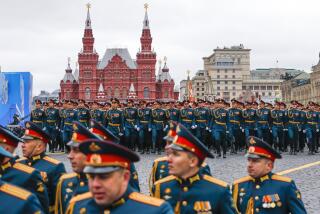From <i> Perestroika</i> to Paranoia : Stalinist bugbear of sinister foreigners returns
- Share via
The Soviet economy is in free fall, Moscow’s authority is increasingly scorned by independence-minded republics, open fears of civil war are being expressed. How should the Soviet Union’s besieged leaders respond to these threats? For one of them, at least, the preferred response is to revive the old Stalinist bugbear of sinister foreign influences and economic sabotage to explain the country’s woes, and maybe to prepare the way for harsher domestic policies.
Consider the sensational interview Prime Minister Valentin Pavlov has just given to the Soviet daily Trud.
An unimaginative if faithful servant of the old order, Pavlov alleges that private Austrian, Canadian and Swiss banks, in combination with Soviet banking organizations, last month plotted an economic coup to overthrow President Mikhail S. Gorbachev. The scheme, said Pavlov, involved flooding the Soviet Union with billions of rubles, creating a hyper-inflation that would discredit the Communist Party and pave the way for a radical change of government. Pavlov is silent on how the foreign banks came to acquire all those rubles, which are largely worthless outside the Soviet Union. But he does say the scheme was foiled only hours before it was to be carried out, when the regime acted to withdraw all 50- and 100-ruble notes from circulation.
The currency call-in, while officially justified as a necessary step toward major economic reform, was enormously unpopular. Millions of ordinary citizens saw much of their life savings disappear overnight, sending confidence in the government plunging even further. Now, Pavlov says the regime was only acting “defensively.” Any blame for hardships suffered should fall on certain Western banks and their domestic co-conspirators.
Pavlov’s claims may be bizarre, but their malicious effectiveness in further undercutting economic reform--especially vital moves toward a market economy--shouldn’t be discounted. Western banks now stand accused of plotting to overthrow the Soviet government. That is not the kind of allegation calculated to encourage foreign investors to enter into joint ventures or otherwise put their capital into helping to restructure the Soviet Union--an effect that may have been intended.
Was Pavlov speaking for himself in unfolding this fanciful story, or was he acting in behalf of a government increasingly dominated by right-wing views, where a nostalgia for Stalinist-style discipline has become more and more apparent?
Vitaly N. Ignatenko, Gorbachev’s press secretary, dismisses Pavlov’s claims with a laugh. Viktor Grushko, the new deputy head of the KGB--who, coincidentally, has just issued his own claims of stepped-up Western spying on the Soviet military industry--says he knows “absolutely nothing” to support Pavlov’s story.
The implication left for now is that Pavlov was talking for himself alone. Maybe. But if so, what does that suggest about Gorbachev’s ability to keep control, not just over the country but over his own government?
More to Read
Sign up for Essential California
The most important California stories and recommendations in your inbox every morning.
You may occasionally receive promotional content from the Los Angeles Times.










